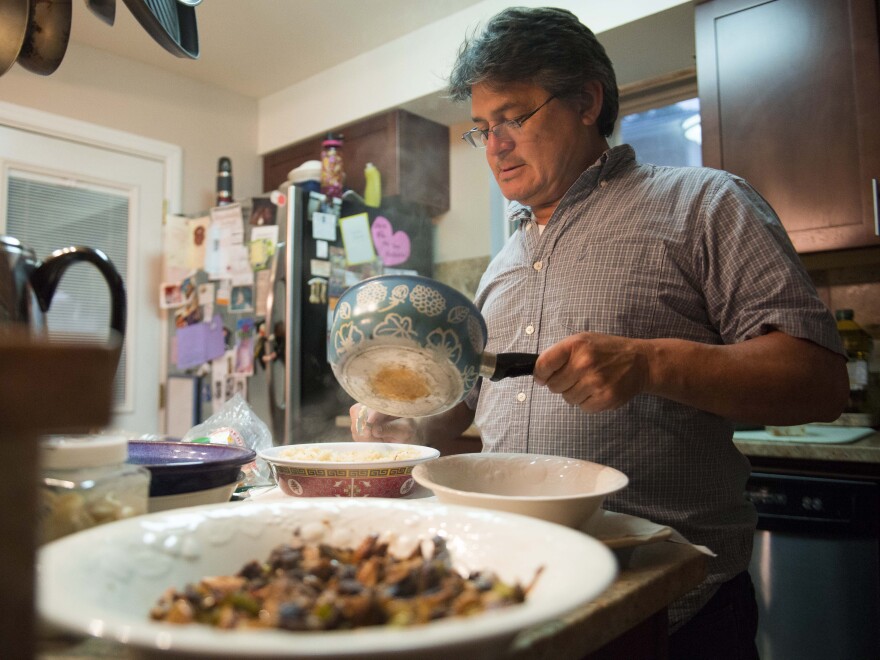Lindolfo Carballo knows there's a stereotype about men like him. He grew up in San Miguel, El Salvador, he says, in a male-dominant culture.
"I'm coming from a so-called 'machista' country, right? I mean, in this country, we all think that Latin America, in general, is where machismo is promoted," Carballo says.
In many families in Latin America, he adds, "parents — fathers and even mothers — teach their kids that men are to be served by their sisters."
But that wasn't what his parents taught him and his nine siblings, says Carballo, who lives in Silver Spring, Md., near Washington, D.C.

For immigrant men, life in the U.S. can be a transformative experience. But many immigrant fathers work hard to hold onto what it means to be a man in their native countries — while also rejecting more rigid gender roles that are sometimes the norm in their homelands.
That's what Carballo, now 52 and a father of a 10-year-old son and 1-year-old daughter, is trying to do.
As a teenager, he supported leftist revolutionaries in El Salvador's civil war, which, along with his parents' teachings, helped shape his egalitarian views about gender roles. After coming to America in 1990, he says, he's found that same machismo that defined mainstream culture in El Salvador here in America.
"I don't think it's a Latino thing," he says. "I think it's a family thing, where families teach their boys one thing and their girls differently."
Carballo, who works full time as a community organizer for an immigrant rights group, often makes door-to-door visits to immigrant families — sometimes meeting with husbands and wives together.
"I ask the woman a question, and it is the man answering the question for her," he explains. "They don't do it on purpose. But I think they feel it's normal for them because that's how they grew up."
Carballo says he's trying to model a different normal for his children by sharing household duties with his wife.

"Doing dishes, it relaxes you," he says. "Doing some work at home, some people think that it's for women only. No, not true!"
Samuel Adewusi, a 54-year-old immigrant father of four living in D.C. agrees. Adewusi, a lawyer, was born in Lagos, Nigeria. His father had no formal schooling and worked as a carpenter. When his mother wasn't around, Adewusi says, his father would often cook and clean.
"The women usually make fun of him, and the men usually just pretend as if they didn't see him," he says. "It's like, 'Oh, leave that man alone! He's something else, you know.' "
Adewusi says his father taught him a man's true strength comes from his character.
"You don't have to fit yourself in any mold that people are trying to put you [in]," he says. "What is necessary to be done has to be done, without trying to say, 'Well, I am in this mold. Men are not supposed to cook.' But you are starving! And you are saying men are not supposed to cook? What kind of crap is that?"
After more than three decades living in the U.S., Adewusi has decided that there are some fundamental differences between Nigerian and American men.
Men holding hands platonically is "totally cool" in Nigeria, he says. But in America, Adewusi learned, it is taboo unless you're in a romantic relationship with another man. He recalls a former classmate in the U.S. who once told him, "Men don't do that! We don't touch each other. We don't hold each others' hands."
That's a shame, Adewusi says. "This doesn't let human beings live to their full extent. [Though] I don't mean to say, 'Well, all of us should go around and start singing 'Kumbaya,' and holding each others' hands.' "
Since moving to the U.S., Adewusi has traveled back to Nigeria occasionally to visit his family. One airport arrival was especially memorable.
"Everybody was there to welcome me and all that good stuff. And my younger brother tried to [hold] my hands. And I said, 'Ah! Don't do that! Don't touch me!' " he recalls with a laugh.
Adewusi says he eventually adjusted back to Nigerian culture during his visit, but the incident reminded him of the limits of being a so-called "man" in America.
Still, he says, he has seen a positive development for men in the U.S. since moving here. "Nowadays you see grown men actually hug each other."
This story was produced for broadcast by Marisa Peñaloza. You can find other stories from All Things Considered's series on what it means to be a man in America today here.
Copyright 2021 NPR. To see more, visit https://www.npr.org.



